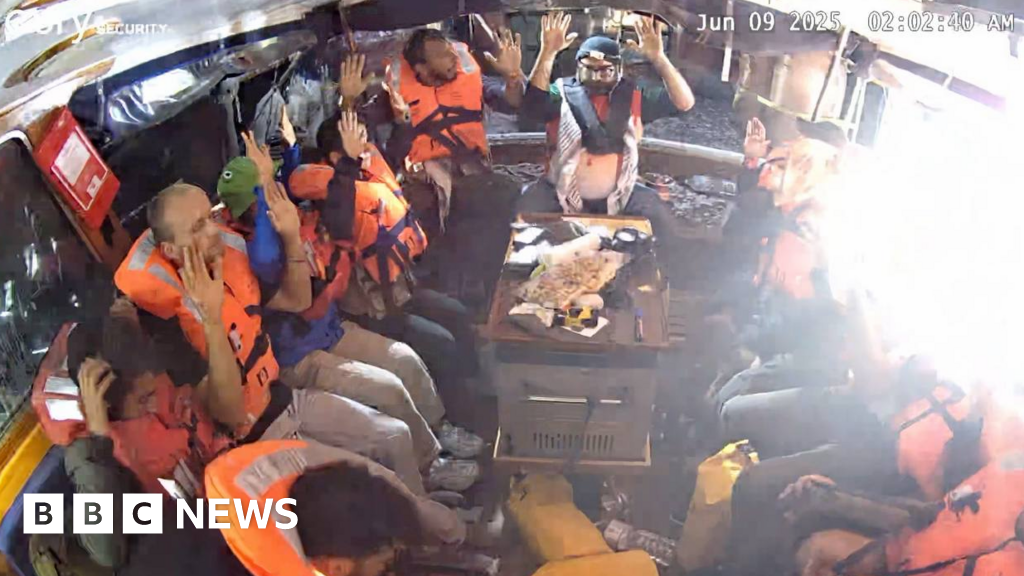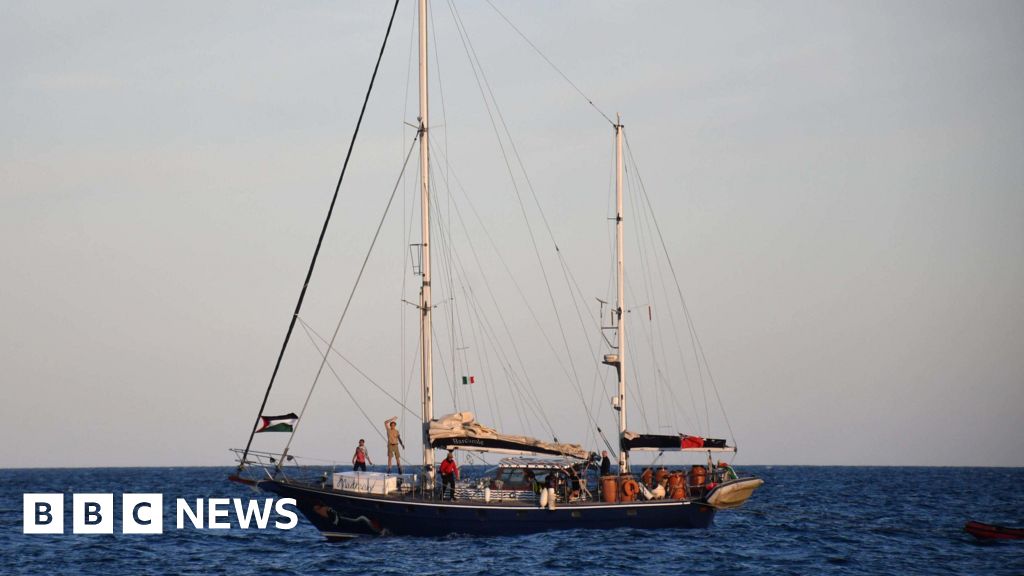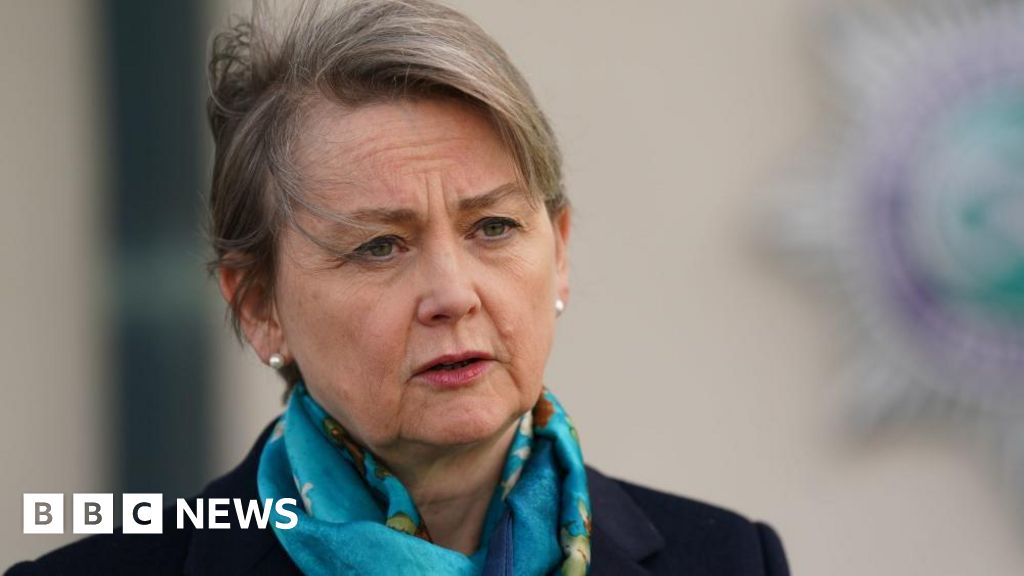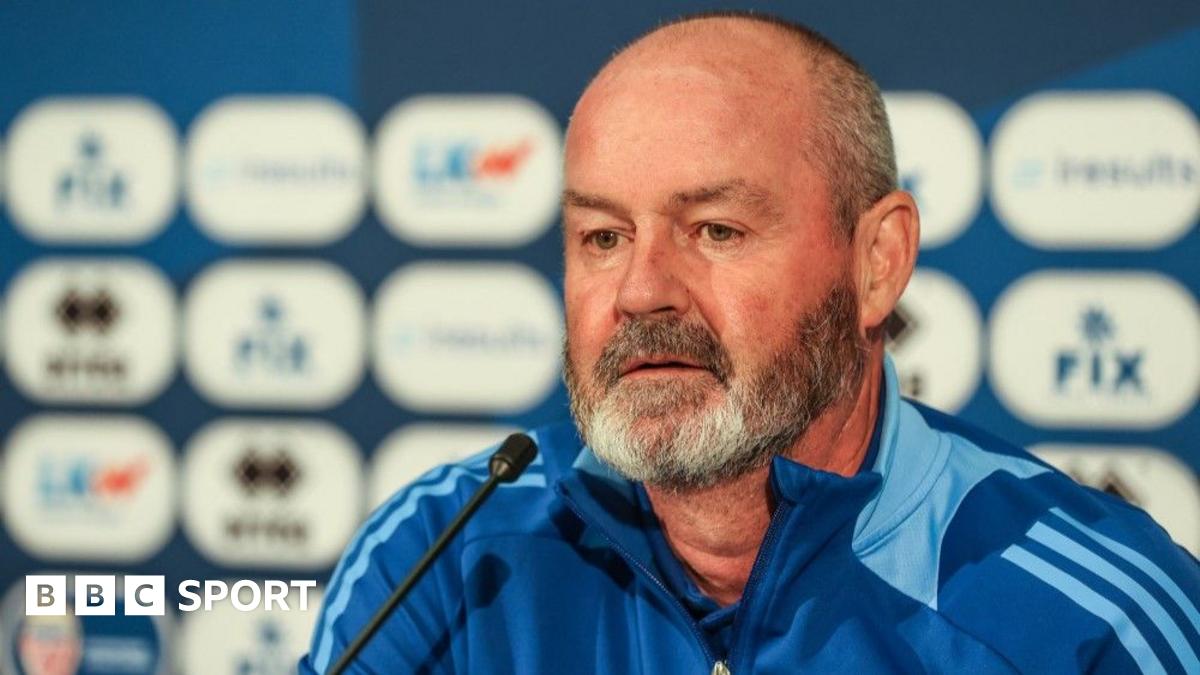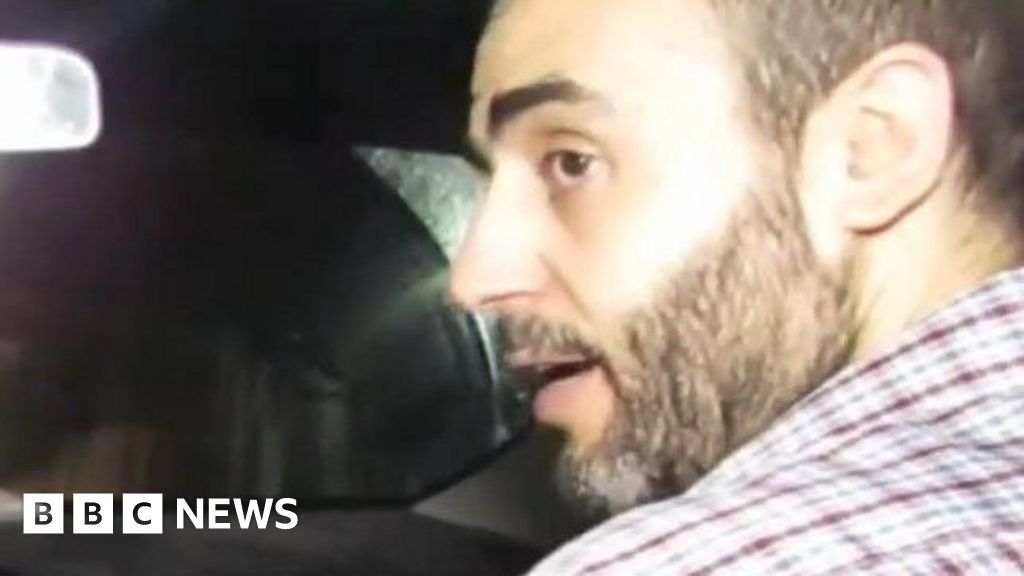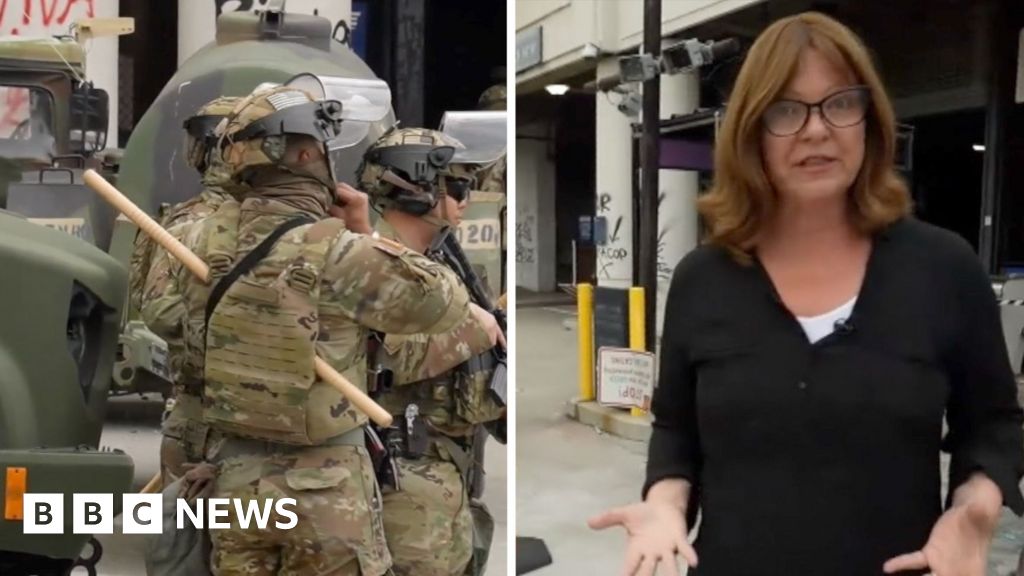Yolande Knell
Middle East correspondent
Reporting fromJerusalem
Imogen Foulkes
BBC News
Reporting fromGeneva

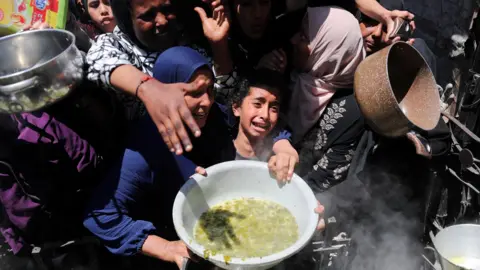 Reuters
Reuters
A third of the community kitchens in Gaza have been forced to shut down over the past two weeks
The US has confirmed that a new system for providing humanitarian aid to Palestinians in Gaza through private companies is being prepared, as Israel's blockade continues for a third month.
The US ambassador to Israel said "distribution centres" protected by private security contractors would provide food and other supplies to up to a million people initially, as part of an effort to prevent Hamas from stealing aid.
Mike Huckabee denied Israel would take part in aid delivery or distribution, but said its forces would secure the centres' perimeters.
The confirmation comes as more details emerged about the controversial plan, which UN agencies have reiterated they will not co-operate with because it appears to "weaponise" aid.
"We will not participate," the spokesman for the UN's Office for the Coordination of Humanitarian Affairs (OCHA), Jens Laerke, told the BBC in Geneva, "only in efforts that are in line with our principles".
He added: "There is no reason to put in place a system that is at odds with the DNA of any principled humanitarian organisation."
Since early March, Israel has cut off all supplies from reaching Gaza - including food, shelters, medicines and fuel - leading to a humanitarian crisis for its 2.1 million residents.
A third of the community kitchens in Gaza - one of the territory's last remaining lifelines - have been forced to shut down over the past two weeks due to shortages of food and fuel, according to OCHA.
Among them were the last two field kitchens of World Central Kitchen, a US-based charity which had been providing 133,000 meals daily before it ran out of ingredients on Tuesday.
Prices of basic foodstuffs have also skyrocketed at local markets, with a 25kg (55lb) bag of flour now selling for $415 (£313) in Gaza City - a 30-fold increase compared to the end of February, OCHA says.

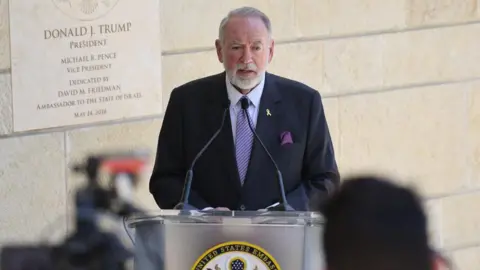 EPA
EPA
Mike Huckabee said US President Donald Trump wanted to do everything possible to get aid into Gaza
Huckabee told journalists in Jerusalem that US President Donald Trump saw aid for Gaza as an urgent matter and that his team was tasked "to do everything possible to accelerate that and to as expeditiously as possible get humanitarian aid into the people".
Israel and the US accuse Hamas of diverting aid. "Previous actions have often been met with Hamas stealing the food that was intended for hungry people," the ambassador said.
The UN and other agencies say they have strong supervisory mechanisms and that when aid has surged into Gaza, incidents of looting have largely halted. The World Health Organization says none of its medical supplies have been looted during the war.
The Trump administration is trying to build momentum behind the new aid initiative ahead of the president's trip next week to wealthy Arab Gulf countries that could help to fund it.
It says that a non-governmental organisation has been set up and that aid delivery will not be under Israeli military control.
Huckabee said: "The Israelis are going to be involved in providing necessary security because this is a war zone. But they will not be involved in the distribution of the food, or even the bringing of food into Gaza."

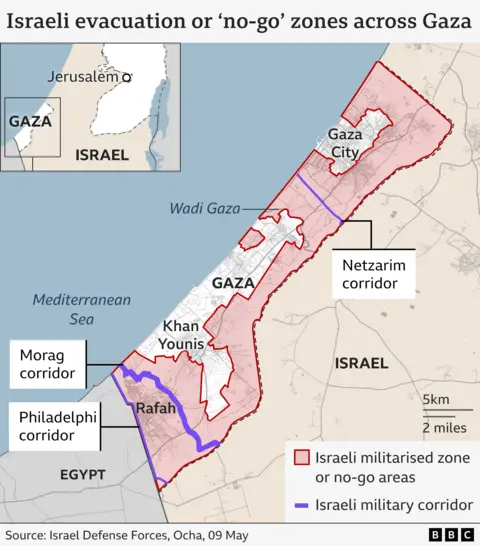
The newly registered Gaza Humanitarian Foundation (GHF) appears to have been set up for this purpose.
A 14-page document from GHF, seen by the BBC, promises to set up four distribution sites, giving out food, water and hygiene kits initially for 1.2 million people - less than 60% of the population. It says the project aims to reach all Gazans eventually.
Aimed at potential donors, the paper states that "months of conflict have collapsed traditional relief channels in Gaza".
It goes on: "GHF was established to restore that vital lifeline through an independent, rigorously-audited model that gets assistance directly - and only - to those in need."
The document maintains that GHF is "guided by the humanitarian principles of humanity, neutrality, impartiality and independence".
Its boards of directors and advisors are said to include a former chief executive of World Central Kitchen, along with the American former head of the UN's World Food Programme, David Beasley - though his participation is not yet confirmed.
Full details of how the aid mechanism will work on the ground are not given.

 Reuters
Reuters
About 60,000 children in Gaza are estimated to require treatment for acute malnutrition
The Gaza war was triggered by the Hamas-led attacks on southern Israel on 7 October 2023, which saw around 1,200 people killed and more than 250 taken hostage. Some 59 are still held captive, up to 24 of whom are believed to be alive.
Israel's military campaign has killed more than 52,700 people in Gaza, mostly women, children and the elderly, according to the Hamas-run health ministry.
Last Sunday, Israel's security cabinet approved an intensified military offensive against Hamas in Gaza which could involve forcibly displacing the population to the south, seizing the entire territory indefinitely, and controlling aid.
This was quickly met with widespread international condemnation. Many of Israel's allies pointed out that it was bound under international law to allow the unhindered passage of humanitarian aid.
The UK's Minister for the Middle East, Hamish Falconer, told Parliament on Monday that the British government was gravely concerned that the Israeli announcements could lead to the 19-month-long war in Gaza entering "a dangerous new phase".
On the subject of aid, he said: "As the UN has said, it is hard to see how, if implemented, the new Israeli plan to deliver aid through private companies would be consistent with humanitarian principles and meet the scale of the need. We need urgent clarity from the Israeli government on their intentions.
"We must remember what is at stake. These humanitarian principles matter for every conflict around the world. They should be applied consistently in every war zone."

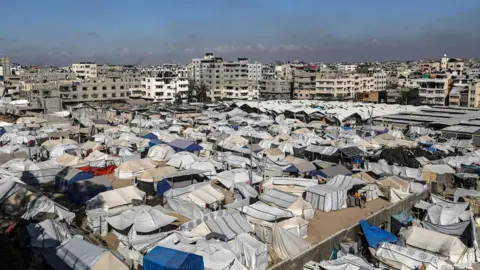 EPA
EPA
Some 90% of Gaza population has been displaced during the war, often many times
This week, the US Special Envoy for the Middle East, Steve Witkoff, briefed members of the UN Security Council - which includes the UK - behind closed doors about the new plan to resume the delivery of aid.
Meanwhile, Israeli media reported that Israeli forces were already setting up distribution hubs in Rafah, in southern Gaza, in "a sterile zone" designed to be free of any Hamas presence.
According to reports, Israel expects that aid will be distributed to security-screened representatives from each Gazan family who would be allowed to take supplies for his or her relatives only. They would be allowed into the hubs only on foot.
The Israeli defence establishment was said to have assessed that the average quantity of aid that would have to be distributed as 70kg (154lb) per family per week.
The Israeli military would ultimately be stationed outside the distribution hubs, allowing aid workers to hand out food without soldiers being directly involved, the reports say.
Israel and the US argue that the new system would prevent Hamas from being able to steal food for its own benefit. By preventing its access to aid and involvement in security for convoys, they hope to reduce the group's influence over the Gazan population.
However, there are major questions over the plan's feasibility. The current UN system uses some 400 points of aid distribution, while the situation in Gaza is now at a crisis point, with warnings that mass starvation is imminent.

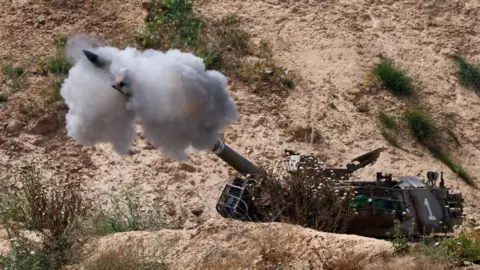 Reuters
Reuters
The Israeli military says it plans to expand the Gaza offensive to return the remaining hostages and defeat Hamas
At a UN briefing in Geneva, aid officials said they had carried out "careful analysis" before deciding they could not participate in the US-Israeli scheme. They said they had not been formally presented with the GHF document that is currently circulating.
James Elder, spokesman for the UN's children's agency Unicef, said the plan that had been laid out would lead to more children suffering, not fewer. He noted that civilians would have to travel to militarised zones to receive aid, meaning the most vulnerable - children and the elderly - would struggle to get there.
He said the decision to locate all the distribution points in the south appeared designed to use aid as "a bait" to forcibly displace Gazans once again. The UN says 90% of the population has been displaced during the war, often many times.
The plan that has been discussed with UN agencies envisages just 60 lorry loads of aid entering each day - far less than they say is needed to meet growing needs, and a tenth of the number that went in daily during the recent two-month ceasefire.
OCHA's Jens Laerke said that, in short, the proposals from the US and Israel "do not meet the minimum bar for principled humanitarian support".
The UN and other aid agencies point out that they currently have tonnes of supplies piled up near Gaza's border crossings, ready to enter, if Israel would allow it to.
Without an end to the blockade, the risk of famine is expected to grow.
Additional reporting by David Gritten in Jerusalem

 1 month ago
55
1 month ago
55
